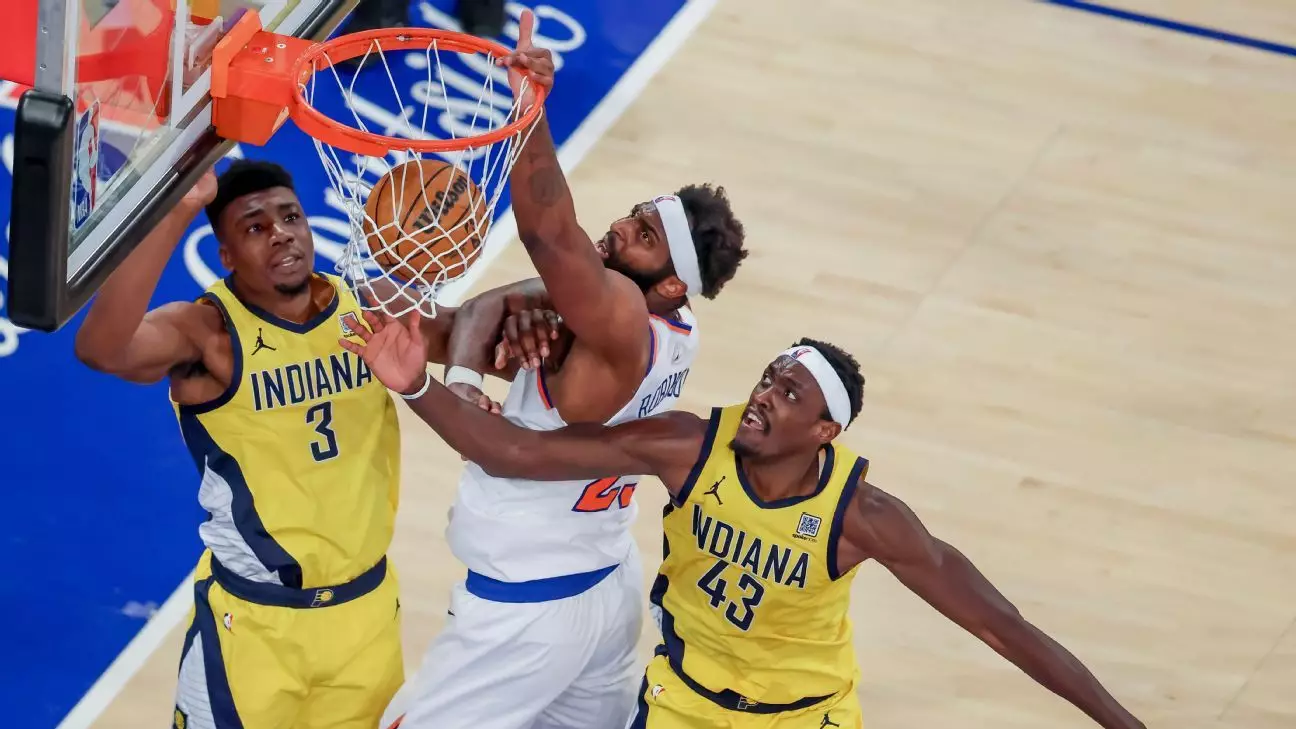In the world of professional sports, every point, every play, and every moment is a crucible of pressure that can make or break a team’s spirit. The Indiana Pacers faced one such moment in a crucial postseason game against the New York Knicks, culminating in a disappointing 111-94 defeat. On the surface, the staggering stats tell part of the story—20 turnovers, a dismal offensive output, and the realization that they had missed a golden opportunity to close out the series. However, the deeper narrative lies in how the Pacers responded—an ode to resilience, yet one layered with questioning and self-reflection.
Star guard Tyrese Haliburton aptly labeled the team as “resilient” in the aftermath of the loss, suggesting that panic would not grip the Pacers’ locker room. Heeding his own advice, he recognized the weight of the stakes—one more game could determine their playoff fate. But resilience isn’t simply a hollow mantra; it has to be tangible, a characteristic that must manifest on the court. The reality, however, is that this resilient team faltered when it was most needed, providing an unsettling platform for self-examination.
The Struggles of an Offense in Crisis
What transpired on the court during Game 5 was an offensive debacle that brought to light the cracks in the Pacers’ armor. From the start, they appeared sluggish; as if burdened by the weight of expectation, their performance declined dramatically. Their starting five shouldered the offensive load poorly, combining for a meager 37 points. This lack of production underlines a fundamental issue that might require a re-evaluation of playing styles, offensive schemes, and player roles.
It’s particularly troubling when your star player, Haliburton, who had previously demonstrated the ability to dominate the game, falters with just eight points on 2-of-7 shooting. For a team with aspirations of advancing further in the playoffs, such a lukewarm performance raises alarm bells for fans and analysts alike. When the “engine” fails to run, the entire vehicle risks falling apart—a scathing reflection on how critical individual performances are to team success.
Lessons in Aggression
It’s one thing to lose a game; it’s an entirely different lament when a team is outplayed in sheer intensity, as the Pacers were in Game 5. The Knicks came out with an aggressive mindset, clearly indicating they were willing to fight for their postseason lives. Coach Rick Carlisle lamented his team’s lack of ‘force’ and ‘attitude,’ reminiscent of a boxer who steps into the ring unprepared and gets punched into submission.
One must ponder: Can the Pacers adapt? Can they adjust their collective attitude moving forward to reclaim their dominance? This must be the mental shift they embrace as they head into Game 6 in Indianapolis. History paints a positive narrative for the team’s ability to bounce back post-defeat. But a steadfast guarantee exists only as long as lessons are learned from past experiences; failure is an excellent teacher, if one is willing to listen.
The Home Advantage
While the clouds of doubt swirl after Game 5, the Pacers still hold a 3-2 series lead, returning to the comfort of their home court for Game 6. There’s an undeniable magic that occurs when a team plays before its home crowd—the energy can uplift players beyond their perceived limitations. Pascal Siakam expressed hope for a resurgence, a sentiment that encapsulates the notion of home-court advantage. The Pacers need to harness that energy, transform it into a collective willpower, and translate it into a tactical edge.
The psychological fortitude required to shrug off a painful defeat is vast, yet it is this very challenge that defines the character of any great team. The upcoming game will not simply serve as a chance for redemption; it’ll be a litmus test for the Pacers’ growth as a unit—whether they’ll stand resilient or crumble under the mounting pressure. The series hangs in the balance, and the lessons of Game 5 resonate loudly in the halls of their arena: intensity matters; collective commitment matters; and perhaps most importantly, adaptation and improvement matter.

